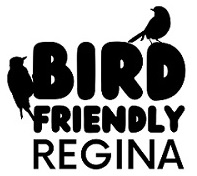In Regina? What questions should you ask your municipal candidate?
Free-roaming Cats
Will you advocate for Regina to implement an active strategy to reduce populations of unowned (feral) cats and mitigate their threat to birds (e.g., removing feral colonies from areas of high bird importance)?
Regina needs a plan to estimate the number and/or distribution of cats outdoors so that progress on reducing the populations of outdoor cats can be tracked over time.
Window Collisions
Regina needs to take measures to reduce window collisions by developing/ implementing bird friendly design standards/CSA Bird Friendly Building Design standard for new construction.
Light Pollution
Regina needs a light pollution reduction strategy for existing and planned neighbourhoods.
Pesticide Use
Regina needs a policy / bylaw to reduce or eliminate use of cosmetic pesticides (e.g., broad-leaded plant control) known to directly or indirectly harm birds on public and private lands
Regina needs to restrict or ban pesticide use to control insects or rodents that are important food sources for birds (e.g., neonicotinoids, Bti for mosquito or midge control, rodenticides)
Biodiversity
Regina needs an official strategy to protect and restore biological diversity in its parks and natural areas. The strategy can include measures such as promoting connectivity between natural areas, buffering core biodiversity hotspots from harmful human activities, increasing the number of protected areas, and bird monitoring within municipal limits to assess the success of the strategy
Climate Change Resilience
How is Regina including Nature-based Climate Solutions (NBCS) in its municipal strategy?
Habitat Management Strategy
Regina needs a habitat management strategy based on ecological and climate considerations including increasing the number of trees and area of the urban forest canopy including leaving snags standing in cases where public safety is not jeopardized and protecting trees on private and public lands and prohibiting active vegetation management during breeding season on municipal lands, including forests, storm-water management facilities, and easements.
